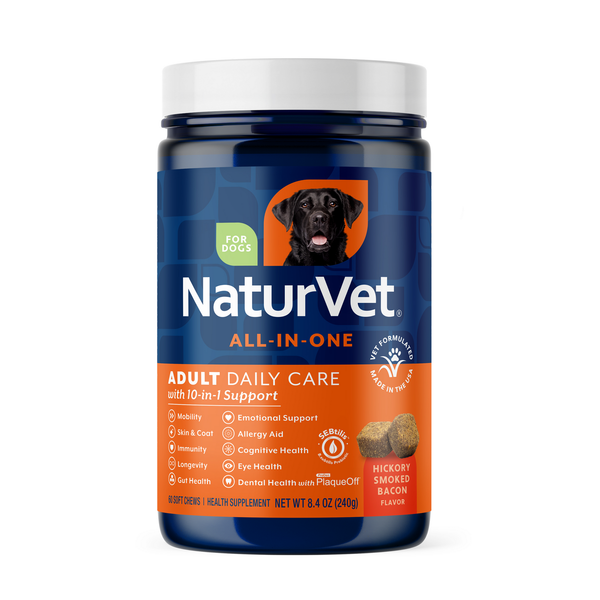Dog Vitamins: A Pet Parent Guide
When and How to Choose the Best Dog Vitamin.
Think of the word vitamin.
Now think of what it means to you and what it implies or suggests.
Generally, the first thought or feeling that might come to you is that vitamins are a good thing.
Ask just about anybody and they’ll probably agree with you. That’s because, as The Harris Poll reported at the end of 2018, more than 85% of Americans take some kind of vitamin.
Other words often thought of in association with vitamins include essential, vital, beneficial, and harmless.
The truth is, all of these descriptive words apply. Dog vitamins can be essential and very beneficial. But there’s lots of other things to know about them to understand when and how to use them properly, especially for your pup.
In this article, you’ll learn what a vitamin really is, some common essential vitamins, situations where dogs may benefit from supplementation, when it’s important to be careful about supplementation, and how to choose the best dog multivitamin.
What is a Vitamin?
This may seem like an easy question, but it’s not. That’s because there’s kind of two definitions. The term vitamin is often used in a very general sense to describe a health supplement.
Multivitamin supplements typically contain actual vitamins themselves, like vitamin A or vitamin C. But they also often contain other nutrients and ingredients important for health, like minerals, omega fatty acids, joint health ingredients, probiotics, and more.
A vitamin is also, well, an actual vitamin, like your A, C, D, and multitude of B vitamins. Next, we’ll talk a little bit about the most essential ones and what they do.
Essential Vitamins
Here’s a list with brief descriptions of essential dog vitamins, just to give you an idea of how important they are and the concerns a deficiency in any of these could cause. Details on the functions of these vitamins are sourced from the National Institutes of Health.
Fat Soluble Vitamins
Fat soluble vitamins are those stored within the body’s fatty tissues and in the liver. Since they are stored, these vitamins can accumulate within the body.
Vitamin A
While eating carrots and sweet potatoes won’t give you superhero vision, they both contain Vitamin A, which is essential for light absorption by the retina at the back of the eye. It’s also important for skin regeneration and for the normal function of the heart, lungs, kidneys, and other organs.
Vitamin D
We can all synthesize this “sunshine vitamin” to some degree when UV rays hit our skin. Vitamin D is a vital part of calcium regulation, which in turn is important for bone and teeth development. It helps the body absorb both calcium and phosphorus from the digestive tract, which are essential minerals for bone.
Vitamin E
Vitamin E is best known as being a powerful antioxidant. An antioxidant is a molecule that binds up substances called free radicals, which are essentially unstable atoms that roam the body, causing damage to cells.
Vitamin K
Vitamin K is needed for bone metabolism and the body’s normal blood clotting mechanisms, without which spontaneous bleeding would actually occur.
Water Soluble Vitamins
Water soluble vitamins are those that are not stored by the body. Instead, any excesses of them are excreted by the kidneys through urine. They include our B vitamins, and vitamin C.
Vitamin B1 (Thiamine)
There are several different B vitamins. Our first one, thiamine, is required for basic cell and neurologic function. It helps generate energy for cells and is needed for moving sensory impulses between neurons.
Vitamin B2 (Riboflavin)
Riboflavin plays a major role in cell function throughout the body and in the production of energy, especially from fats.
Vitamin B3 (Niacin)
Niacin is important for skin health and for helping to break down sugars and fats into more useful components.
Vitamin B5 (Pantothenic Acid)
True to its naming origins of “pan” which means “all”, pantothenic acid plays a huge role in nearly every metabolic reaction in the body, as well as the creation of energy for cells.
Vitamin B6 (Pyridoxine)
Amino acids are the building blocks of all proteins in the body. Pyridoxine helps the body metabolize and use amino acids. It also plays a crucial role in cognitive development by helping to make neurotransmitters.
Vitamin B8 (Biotin)
Similar to Niacin, Biotin is important for skin health. It’s also needed for breaking down glucose, fatty acids, and amino acids, all building blocks of important nutrients our bodies need.
Vitamin B9 (Folic Acid)
Folic acid is a pretty crucial B vitamin, as it helps to synthesize DNA, the basic building block of life.
Vitamin B12 (Cobalamin)
Cobalamin is necessary for the creation of new red blood cells, and similar to folic acid, DNA synthesis.
Vitamin C
Vitamin C is an important vitamin. Sailors prior to the mid 1700s discovered this when they suffered from poorly healing wounds, joint pain, gum disease, weakness, and many other disease signs until produce became a standard foodstuff at sea.
But unlike millions of unfortunate sailors, just about any animal can synthesize their own vitamin C, with the exception of guinea pigs and primates. This means it is not truly essential for dog's vitamin diet, because they don’t require it in their diet to meet their body’s needs.
But vitamin C’s well-known benefits for immune health and as an antioxidant still make it an important component of most multivitamins for dogs, as higher levels than what the body typically makes can give the immune system a boost.
What Other Essential Things Might Be Found in a Multivitamin for Dogs?
Two other really important components of multivitamins include minerals and omega fatty acids. Both of these nutrient categories are essential for health.
Minerals like calcium, phosphorus, potassium, and iron are needed in certain amounts and ratios for multiple processes throughout the body. It’s important to be careful about excessive supplementation of these however, as excesses can cause toxicities.
For example, some folks may wish to supplement their large breed puppy’s diet with extra calcium for bone growth. However, this has been known to be unnecessary as long as the puppy is on an appropriate large breed puppy diet with the right ratios of calcium and phosphorus. Supplementing excess calcium can lead to developmental bone abnormalities.
Omega fatty acids are pretty vital nutrients. Omega-6 fatty acids are pro-inflammatory, which is actually important and needed by the body, but excesses can be problematic. Because omega-3 fatty acids are generally anti-inflammatory, a roughly equal balance of the two is necessary to keep things in equilibrium.
Omega-6’s are found abundantly in the diet, so supplementing more omega-3’s can encourage a shift for a better balance and reduced inflammation in the body.
When You Should Consider a Dog Multivitamin
There are several situations where a multivitamin can be really important to consider for your pup. A lot has to do with diet and especially the quality of diet a dog is getting. There are other situations, like nutritional disorders, poor eating behaviors, and activity levels, that we’ll also discuss.
Poor Quality Commercial Diet
Every week I feel like I hear about a new commercial brand of dog food that I’ve never heard of before (and as you might imagine, I’ve heard of quite a few). This only highlights just how many diets are out there. There can be a great degree of variation in quality, ingredients, and nutrition.
One way to know that your pup’s food should be meeting nutritional standards is to look for the AAFCO nutritional adequacy statement on the bag or can.
The Association of American Feed Control Officials (AAFCO), is a non-profit corporation which provides guidelines for pet food formulation and is the main body through which state and federal agencies adopt laws enforcing pet food regulation.
For a commercial pet food to carry the AAFCO statement of complete and balanced nutrition, nutritional requirements like minimum and maximum percentages of certain vitamins and minerals, must be satisfied.
While AAFCO regulations are not laws in and of themselves, a majority of states have incorporated the regulations in laws governing pet food manufacture and distribution.
A multivitamin should be considered in cases where a commercial diet’s nutritional adequacy is uncertain. The diet itself of course could also be changed, but there may be many reasons a parent chooses to keep a dog on a particular diet and supplement with a multivitamin if needed.
Homemade Diet
Home-cooking is becoming increasingly popular. Many folks love to cook and they want to cook for their dogs. But even some of the best cookbook recipes for pets have been found to be lacking or missing key nutrients.
A comprehensive multivitamin supplement should be considered if you do a lot of home cooking for your pup. Your veterinarian can also help you get in touch with a board-certified veterinary nutritionist who can advise on formulating a balanced diet at home.
Raw Diets
While their benefits are still controversial, there’s no doubt that raw diets are also gaining in popularity. There are actual commercial raw diets that do meet AAFCO nutritional guidelines. But for the really dedicated pet parents who develop their own raw diets at home, a multivitamin should be considered to help fill in nutritional gaps, just like with any home-made diet.
The Picky Eater
It’s true, some dogs just don’t like kibble. But some also don’t like canned food or even fresh commercial diets. I’ve even had some pup patients that will only eat boiled chicken and rice or ground hamburger meat. While easily digestible and a good source of protein, this kind of diet is greatly lacking in vitamin and mineral content.
There has to be some balance struck between making sure a pet is eating and getting calories, but also getting comprehensive nutrition. A multivitamin can help to bridge that gap.
Table Feeding
Because what humans eat has a great deal of variability from household to household and a lot of it tends to be high in sodium and calories, veterinarians generally discourage table feeding. However, if it’s common in your home for your pup to eat “a little bit of whatever we eat”, it’s also important to recognize that there are likely nutritional gaps for your pup with this practice, even if you view your food choices as healthier.
Depending on how much table feeding is a part of your dog’s routine, a multivitamin can be important to fill in nutritional gaps left by the dinner table.
High Performance Dogs
Athletic dogs or working dogs often have far more intense nutritional needs. Depending on what the diet is like, these pups may also benefit from a multivitamin to account for increased metabolism, muscle activity, and calorie usage. Even if your dog isn’t at a level of competing in events but goes on runs or jogs with you for several miles a week, supplemental nutrition can be useful to help keep things “running”.
Malabsorption Disorders
Essential vitamins and minerals must be acquired through the diet. If they can’t be absorbed well, your pup can’t use them. In cases where a dog can’t digest nutrients very well, or has trouble gaining or maintaining weight, additional nutritional supplementation may be beneficial. Your veterinarian needs to be involved here of course, because an underlying cause needs to be determined and your vet may have specific nutritional recommendations for you. But a multivitamin can be very useful to make additional nutrients available.
When Should I Be Careful Using a Multivitamin for My Dog?
Many multivitamins are very safe to use and adverse effects are uncommon. But as mentioned earlier on, it’s always important to remember that some vitamins and minerals can accumulate in the body. At very high levels, these can cause toxicities. For example, excessive levels of calcium and vitamin D can lead to bone abnormalities, especially in growing puppies. Excessive levels of vitamin A can lead to skin, weight, and mobility issues.
It’s always important to chat with your vet before starting any new supplement, to make sure it’s appropriate to start and unlikely to cause any adverse concerns. It’s also always important to follow a multivitamin’s feeding guidelines closely. Breaking with those guidelines and excessively supplementing can lead to concerns. Don’t assume that just adding more of a multivitamin correlates to being more healthy.
How Do I Choose the Best Dog Multivitamin?
There’s tons of multivitamins out there! So how do you pick the right one for your pup?
First, if there is a particular nutritional concern or if your dog has a medical condition, make sure you're consulting with your veterinarian, to help manage any underlying illness. Your vet may have specific recommendations for what is most appropriate.
It is important to never use a multivitamin in your dog that has been developed for people. The levels of certain vitamins or minerals may be inappropriate, and other ingredients or flavoring may not be safe.
Nutritional supplements are not regulated by the FDA, which may surprise some folks. In fact, there is very little regulation involved in how many dietary supplements are manufactured. That’s why you need to make sure to look for evidence that a manufacturer has produced a supplement to very high standards.
Just like you might look for the distinctive US Pharmacopeia (USP) Verified Mark on your own multivitamin, you need to look for evidence of a similarly high standard for your dog.
When looking at products made for dogs, always look for the National Animal Supplement Council (NASC) Quality Seal. In order to have permission to display the NASC Quality Seal, member companies must voluntarily follow very strict measures including independent facility inspection, random product testing, adverse event reporting, and strict labeling guidelines. This helps to ensure a safe and quality product for your pup.
Conclusion
A multivitamin can be a really beneficial and healthy addition to your pup’s nutritional lifestyle. This is certainly the case with “picky eaters”, highly active and athletic dogs, and when preparing meals for your pup at home. But there are certainly cases where a multivitamin may not be needed.
That’s why, before you start any kind of supplement, make sure to have a conversation with your vet. When your vet knows your pup’s health history inside and out, he or she can help you decide if a multivitamin is right for your pup. Make sure to bring up any particular concerns about specific health issues that you might have.
When you work together with your veterinarian, including cooperation on general health, diet, and any medical concerns, you can work towards ensuring a happy and healthy life for your pooch, helping to preserve the special bond you and your furry friend share.
JOIN OUR PACK
Follow us @NaturVet on social media to fill us in on any tips we might have missed. And, check out the rest of NaturVet.com. We’ll keep you up to date on all our latest pet resources, supplements, tips and tricks, and more – everything you need to be the best pet parent possible.


























